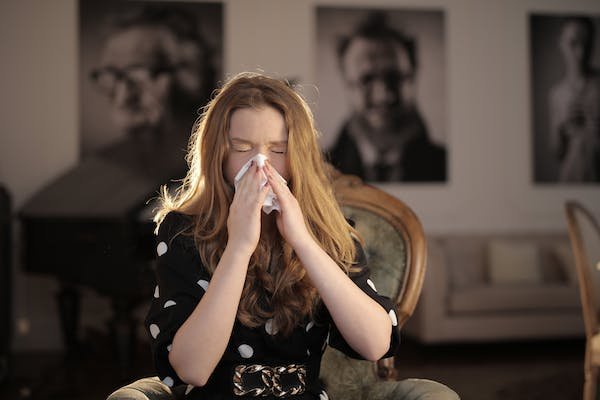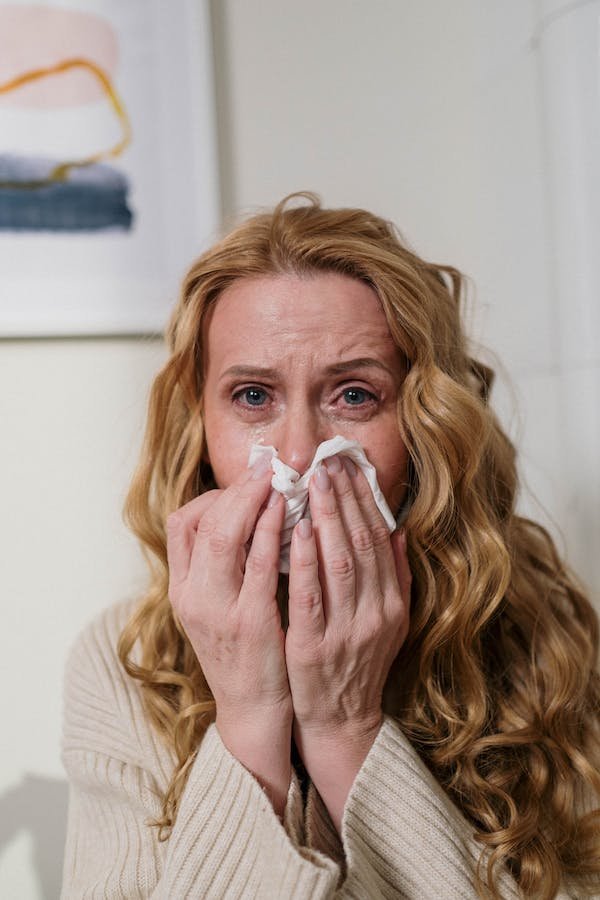What you must know about Allergic Rhinitis-Hay Fever.
It has always been advised that we should visit the hospital whenever we have any strange feelings, most people would see sneezing as a normal feeling that will disappear within a few days, but the usual sneezing may be another health issue, an example of this occurrence is Hay fever.

pexels.com/
Hay fever, scientifically known as Allergic rhinitis, is an allergic reaction leading to congestion, sneezing, sore throat, and itchy nose. While hay fever could make you feel uncool with yourself, relief can be achieved with specific lifestyle changes, medications, and immunotherapy. Hay fever is a reaction to tiny particles in the air known as allergens, when we breathe in allergens through the mouth or the nose, our body automatically reacts by releasing a natural chemical called histamine, lots of indoor and outdoor allergens cause hay fever, common causes of hay fever are mold, pet dander, dust mites, even pollen from plants and trees.
A person who has hay fever shows symptoms like; nasal congestion, sneezing, and nose, throat, mouth, and eye irritation. When the symptom is associated with fever, it may be a result of pollen. Pollen is a fine powder released by plants as a part of their reproductive cycle. The allergy could be to tree pollen, grass pollen, or even wood pollen.
Tiny flecks of skin hair shed by cats, dogs, and other animals as long as they have feathers and furs can also create allergies.
The symptoms of hay fevers are;
- Cough.
- Sneezing.
- Runny nose/ nasal congestion.
- Watery/itchy eyes.
- Mucus that runs through the back of the throat.
- Extreme feeling of fatigue, which is often due to insufficient sleep from the uncomfortable feeling.
Hay fever can happen at any time but may be more severe at certain times of the year, seasonal allergies to hay fever include: - Encounter with grass pollen which is common between late spring to late summer.
- Dust mites, and cockroach droppings, are usually present all year round.
- Spores from outdoor and indoor molds and fungi, which could either be seasonal or an all-year-round situation.
- Tree pollen, common in the early spring.
- Ragweed pollen, common during the fall.
With the very close matching symptom that hay fever has with, common cold, it is very easy to confuse them one for another, but there is a slight difference between them if properly observed.
In case of hay fever, it has symptoms of a runny nose with a thin watery discharge but no feeling of fever. In the case of the common cold, however, there is a shown symptom of a runny nose with a watery or thick yellow discharge, associated with body aches and low-grade fever.

pexels.com
The signs of hay fever become evident the moment there is an exposure to an allergy, but in the case of the common cold, it will take 1-3 days after there has been exposure to a cold virus. While the common cold will disappear within 3-7 days, hay fever will last for as long as exposure to the allergy remains.
Understandably, the immune system is the manner in which the body protects itself, it functions this way by producing immunoglobin E (IgE) antibodies to create protection against these allergens. When you have hay fever, your immune system instantly identifies a possibly harmless substance as being harmful. The risk of developing hay fever is attached to one of these occurrences;
Having a bloodline of a person with persistent allergies or asthma.
Having eczema or atopic dermatitis, which makes the skin itchy and irritated.
Getting exposed to strong odors, smoke, or any other thing that irritates the nose lining.
Constantly staying/working in an environment where there is constant exposure to allergens like dust mites and animal dander.
Hay fever can come with complications that will affect the quality of life;
Regularly feeling cold and sneezing may reduce normal everyday enjoyment, reduce productivity at work, or less time on school activities. The symptoms linked with hay fever, may also worsen the case of asthma, as well as make it difficult to stay asleep.
Treating hay fever is not impossible, the symptoms can be managed with over-the-counter medications, and sometimes a combination of two or three will be prescribed by a physician. The medications often used include;
Eye drops which will limit the swelling and itching of the eye, the eye drop is usually used alongside other medications.
Nasal corticosteroids: These sprays have the ability to treat the inflammation caused by hay fever, offering an effective and safe long-term treatment that may take weeks before the benefits get to show.
Antihistamine tablets or sprays: These sprays and tablets often stop the release of the chemical histamine, these tablets and sprays would relieve the symptoms of runny nose, sneezing, and itching but they will not unblock congested sinuses.
Immunotherapy functions by providing long-term relief, which it does by desensitizing the immune system to the allergens triggering the symptoms. Immunotherapy may create a lasting solution to the allergy symptoms, preventing the further development of new allergies and even asthma.
If hay fever is experienced during pregnancy, it is best to speak with a doctor before going ahead to take medications of any kind, unprescribed medications can cause serious danger to the pregnant woman and the unborn child.
There is no perfect way to avoid getting hay fever, the best thing to do is to lessen exposure to the allergies that will trigger the symptoms, speaking of lessening exposures to allergies, these tips will help significantly.
If you do not want hay fever to happen in the future, ensure to wear sunglasses in order to keep pollen out of your eyes and wash your hands properly with soap and water after petting an animal. During high pollen periods keep windows and doors closed while you use an air conditioner in your home and car.
Do not try to rub your eyes, doing so will irritate the eyes and could escalate the symptoms.
Conclusion.
Hay fever is basically the reaction of the immune system to things our body is allergic to, the best way to prevent the occurrence of hay fever is to properly understand your body, know what you are allergic to, and stay far away from it as much as you can, recommended medications will help get your daily routine back into the track, so you should visit a doctor as well. Thanks for reading, I hope you enjoyed reading.
Allergies are extremely common. The one you are talking about itself is. In cities it also occurs with great frequency, quite contrary to what you might believe about the fact that it is more prevalent in the countryside.
Treating it seems to be simple, however, very often the attenuation of the symptoms is only for a short time because a few days later the symptoms reappear.
Hello @apineda, appreciate your time, although I haven't experienced one first hand, I am certain so many people are allergic to different things based on body adaptation.
Yes friend, as described in the post, here is no perfect way to avoid getting hay fever, the best thing to do is to lessen exposure to the allergies that will trigger the symptom.
Understanding our bodies will help us understand our allergies better and stay away from them to avoid getting hay fever and other allergy infections.
Exactly, understanding what our body reacts against is the best way to stay away from every form of infection.
I believe it has diverse symptoms like sneezing, runny nose, and many more. Proper medications need to be applied.
Medications will help suppress the symptoms, it is however better to stay away from anything that will lead to its symptoms.
Thanks for your contribution to the STEMsocial community. Feel free to join us on discord to get to know the rest of us!
Please consider delegating to the @stemsocial account (85% of the curation rewards are returned).
Thanks for including @stemsocial as a beneficiary, which gives you stronger support.